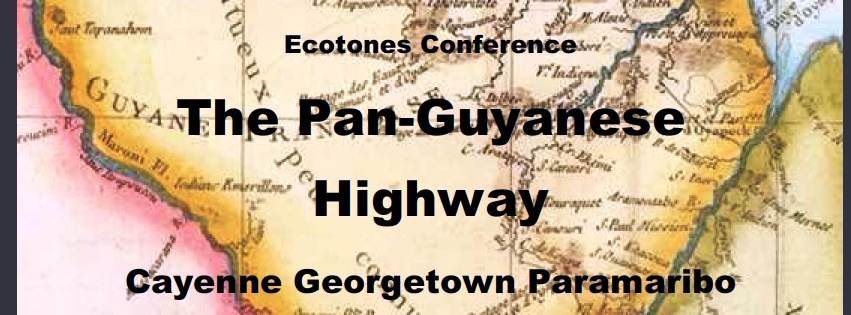KITLV/Royal Netherlands Institute of Southeast Asian and Caribbean Studies

- This event has passed.
Celebrating the Guyanas: The Pan-Guyanese Highway: Cayenne-Georgetown-Paramaribo
01/10/2015 - 03/10/2015

Three days Conference; The Pan-Guyanese Highway: Cayenne – Georgetown – Paramaribo
Celebrating the Guyanas 3G Network
Ecotones Conference
The Pan-Guyanese Highway : Cayenne Georgetown Paramaribo
Amsterdam, 1-3 October 2015
In the on-going process of tracing historical ties and redefining Caribbean contemporary identities, the search for new imaginations and new modes of communication has taken a broad flight. Mass media play a remarkable role in the process. Oral traditions on the verge of extinction find new means of expression by spoken-word and digital artists, and in the use of social media. More and more films, documentaries and television programs are produced on the Caribbean but also in the Caribbean. Important contributions have been made in fictional prose and popular fiction too.
In the context of an increased emphasis on transcolonial relations, one will note that many of these productions still depend on western funding and distribution, but a local industry of smaller productions has arisen as well and challenges traditional perspectives on gender, sexuality, ethnicity, and post-colonialism. In parallel, interdisciplinary research has documented the ways mobility, historical memory and hybridity have nourished contemporary Caribbean identities.
The co-convenors of the conference bring the attention on the possible, or impossible, avenues of communication between the three Guyanas (French Guyane, Guyana, Suriname), a set of countries rarely focused upon for their commonalities and / or discrepancies. If trans-Atlantic and North-South relations are elaborated more than inter-Caribbean relations, what is the situation regarding French Guyane, Guyana and Suriname? What are the socio-economic conditions supporting, or hindering, their relations? What are the modalities of this dialogue and what does it tell us about the Caribbean as a whole? Why are the literatures of those three separate, yet historically and culturally linked regions so poorly represented in the respective “canons” of postcolonial and post-nationalist literature?
Click here for more information on the conference …>> or here…>>
Details
- Start:
- 01/10/2015
- End:
- 03/10/2015
Organizer
- Ecotones
- werkgroepcarlet@gmail.com
- View Organizer Website
Venue
- Doelenzaal, University Library of Amsterdam
-
Singel 425
Amsterdam, + Google Map - View Venue Website



